- Home
- William Kowalski
The Adventures of Flash Jackson Page 26
The Adventures of Flash Jackson Read online
Page 26
I found a rock and sat on it. This was bad, very bad. There was nothing I could do for these two—nothing. I couldn’t even give them a decent burial. I wasn’t about to handle their corpses, and besides, they were in the forest, which had its own way of performing funerals. If I left them alone for, say, several weeks, they would be mostly gone when I came back. There were plenty of scavengers around who would not turn up their noses at such a tasty treat. In fact, I was surprised they hadn’t started work already. Must have been the smell of fuel that kept them off so far. It was everywhere.
My heart skipped a beat as I realized how lucky we were that all that fuel hadn’t caught fire. There would have been a mighty conflagration then. We all would have had to relocate, and maybe even my beloved oaks would have been lost. The forest gods were certainly keeping their eye out for us. Maybe Grandma was spreading her hands over her forest like some kind of divine being. Or maybe it was just luck.
Shit, I thought. I already knew I couldn’t pretend this hadn’t happened. These men had families, no doubt. Somewhere in the world, someone was worried about them. I began to feel sorry then, not for them—they were beyond help, and I have never felt sorry for the dead, only for the dying. I felt instead what their children would feel, if they had children. I knew how hard it was to lose a father and not even be able to point to anything concrete and say, That is what used to contain him, that is what he used to be. They had to at least have a body to bury. It would make things much easier, at least from my perspective. And their wives, too. Their parents. Everyone had parents.
I would call someone on the cell phone I’d found. That was it. I could still hide that way. I could tell them roughly where the plane was, and then I could scurry back to my own territory, safely out of sight and out of earshot. They would come with their equipment, and do what they had to do, and then leave.
I dug up the cell phone, glad that at least I’d taken the time to make a note of where I’d left it. Obviously it had belonged to one of the men in the plane. Perhaps it had been thrown that far, though it hardly seemed possible. Perhaps it had simply fallen out when they started hitting the trees—as if the doors had been ripped open by the branches. If I started hunting around, I thought, I would probably find other things that belonged to them too. But I decided that the less I knew about them the better.
I brushed the dirt off the cell phone and blew into the mouthpiece. Then I turned it on and pressed those three magic numbers, 9–1-1. A voice answered almost immediately.
“Nine-one-one, what is your emergency?”
“Plane crash,” I croaked.
“What? Hello? What did you say?”
“Plane crash. Two men dead.”
“Can you identify yourself?”
“Haley,” I said. Then I punched myself in the leg. Why did I tell them that?
“Where are you calling from?”
“A cell phone. In the woods.”
“You say there’s been a plane crash?”
I sighed. “Yes,” I said.
“Is anyone hurt?”
“Two. Men. Dead.”
“Okay, hold on.”
There was a brief pause while this person did something, somewhere far away. Then her voice came back on the line.
“Caller—Haley—where exactly are you?”
“Ah,” I said. I looked around. This would have been easy to explain to a squirrel, for example, but to some random emergency operator it posed a formidable challenge. One mile west of the big oak grove? Half a morning’s walk from the stream?
“Take the county road east out of Mannville,” I said. “Go about ten miles, to the fire road across from a pond. Take it into the woods as far as you can go.” My voice gave out on me suddenly.
“Caller? Are you injured?”
“No,” I said. “Just don’t talk very much, is all.”
There was a brief pause.
“I see,” said the operator. “Go on.”
“Plane’s about another two miles from the end of the road, I’d say northwest,” I told her. “Two-seater. Both guys dead. That’s all I can tell you.”
“Caller, do not leave the scene,” said the operator. “Okay, Haley?”
“No,” I said. “Not okay.”
“Haley, do not leave the scene,” she repeated.
“I have to leave. I don’t belong here. I’m only calling.”
“It’s a crime to leave the scene of an accident. Do you understand?”
“I don’t care,” I said. “You’ll have to find me. These are my woods.”
“They’ll find you,” she said.
I hung up.
That is to say, I not only hung up, I clapped the phone shut again, regarded it for a moment as it sat in my palm like some kind of artificial, space-age clam, and then threw it as far as I could. It disappeared in the trees without a sound.
They wouldn’t find me. It was impossible. I could hide better than they could look. I could live out here forever, and no one would ever know. So it was a crime to leave the scene of an accident? Big deal. I didn’t cause the damn plane to crash. That would be obvious even to the thickest of sheriff’s deputies.
But then I would be hiding forever, I thought glumly. They wouldn’t give up. Their official curiosity would be aroused. These people, these law-enforcement types, took themselves even more seriously than Andrew Watkins of the university took himself. My peace and quiet would be ruined, and I would live in a constant state of paranoia, even more so than I did now. Oh, these bastards. Why did I make that call? Why?
I went back to the plane then, not right up to it but to a safe distance, where I could look inside and see the two men. I wanted to get a better look at the people who had ruined my life. I could just see the head of the passenger jutting out from behind a trunk.
“I hope you two are happy,” I said. “Because now you’re causing trouble.”
Well, as Mother used to say, if you can’t make up your mind about something sooner or later, you’re going to get it made up for you. I hadn’t been able to decide whether I belonged in the forest or not. Never mind that since having that thought I had become more comfortable here than I’d ever been anywhere in my life. I had had that time of doubt, and that had planted the seeds for this to happen. Maybe I did want to go back. That was what had led me to make that phone call. A real forest woman, I thought disgustedly, would have let them sit there and rot. Forest women do not have time for compassion. They are always on the move. But I had caved in and called the police, like a sissy. And now I was going to pay the price.
I sat back on my heels and thought. How long would it take them to get here? Hours, at least. And it would be days before they could get enough crap back here to haul the plane out. Think of the uproar that would cause in the neighborhood. What would happen to me when they came? Would I be arrested? What should I do with myself in the meantime? What sort of preparations should I make? What kinds of things do you do to get ready for jail?
And when, I wondered, had I stopped thinking of myself as Flash Jackson and started thinking of myself as a forest woman? It had happened so subtly I hadn’t even noticed. Maybe it was when Grandma disappeared. Or no—before. When we had spent that long, cold winter staring at each other across the little patch of dirt floor that we called home, as her teachings seeped into me. Just as Adam had seeped into me. Seeds being planted. Things growing within. Was I never going to be anything more than a fertile field, a receptacle? When was I going to start making things happen, instead of letting them happen to me?
Umpf, said something behind me, as if to punctuate my question.
I jumped up and spun around. It was Bear.
So finally we meet, I thought.
He wasn’t as large as I’d imagined he’d be, but he was large enough to make my heart stop. I’d never been this close to a bear before. I froze. The smell of fuel must have masked his odor as he came up behind me, but now his smell was as massive as he was. He was about eigh
t feet tall, his eyes two black, intelligent beads, his nose wet like a dog’s. He was only a few short steps away. All he’d have had to do was lunge forward and open his mouth, and I would be his.
“Oh, God,” I said, unable to help myself.
At the sound of my voice, Bear cocked his head to the side, again like a dog. He appeared to wait for me to explain myself. When I didn’t, he shambled backward a few steps and then carefully made his way over to the plane. The smell of death must have attracted him, I thought. So he wanted them, not me. Yet he must have known who I was.
“Bear,” I said, careful to keep my voice calm.
He ignored me now. He stood up and nosed the nearer of the two bodies, prodding it gently. I had a better opportunity to admire him. His dark, thick coat shone in the dappled sunlight coming through the trees. His ears looked too tiny for the rest of him. Powerful muscles, strong enough to rip my head off with one swipe, moved in awesome waves under his fur as he poised himself on the cockpit doorframe. I could have sworn I saw his nose wrinkle with distaste as he examined the unfortunate occupants of the plane. Bears didn’t like eating dead things—only live ones. I stayed exactly where I was, too fascinated and too afraid to run.
Bear finished his once-over of the plane and turned to the surrounding area, digging around under leaves, sniffing at the plane’s tires. Every once in a while he looked up at me, as if to make sure I was still there. We locked eyes several times. I had read somewhere, long ago, that the last thing you should do with a bear is make eye contact with him. They take it as a challenge. You’re supposed to drop to the ground and pretend you’re dead. You let them paw you and maybe slobber on you a bit, and then they go away. But I knew that with two real dead bodies here I wouldn’t fool him, and besides it was too late for that. Who knew how long he’d been following me? Maybe he was only toying with me. I didn’t think so, though. I didn’t think he wanted to hurt me at all.
“You better get out of here,” I said to him. “People are coming.”
Owf! said Bear.
“If they see you, they’ll hurt you,” I said. “Seriously. You better go.”
Mrap! said Bear. He turned quickly and approached me again, moving at a trot. Terror overcame me once again. I felt a warmth on my thigh as urine trickled down my leg. I could only hope that he wouldn’t want to eat me if I was covered in pee.
He stopped inches away, prodding my belly with his nose just as he had done to the corpse in the plane. Then he sat back on his haunches, and we locked eyes once more. His odor was so strong I nearly fainted.
Then, without another sound, he was gone. He got up and headed off at a good clip into the trees, and I knew he’d heard something.
“Bye,” I whispered. I felt something had been communicated between us, though I didn’t know what. I was weak in the knees, and I collapsed in a sitting position, trying to catch my breath. I became aware that I was hyperventilating. I had just escaped death, for no reason that I could put my finger on. It simply wasn’t my time today. Had he known there was a baby inside me? Could he smell it, and that was why he’d left me alone?
It didn’t matter. I had finally met him, and it was a meeting I would never forget for the rest of my life, especially because of what happened next.
From far away, I heard a whump-whump-whump, like clouds colliding, softer than thunder but no less insistent. With astonishing rapidity the sound came closer, disturbing the air far above my head. I stood up and looked around. Panic grew in me, but I forced it down. I had to face up to this. I couldn’t spend the rest of my life running away from things. I had to deal.
The helicopter appeared like a vision from one of my earliest nightmares, suddenly and without any more warning than that initial soft sound, and then it was over me and I had the impression that I had been picked up and thrown into a blender. The long, dark shape hovering overhead conjured up every dark fear I’d ever had. The noise was horrific. I could only stand and stare upwards, my eyes watering from the downdraft of the massive blades. It paused overhead, and then, like a spider, it produced two long strands of rope from its belly. One of them fell just at my feet, like a portal to another world. Other shapes appeared then—men, sliding down the ropes, landing silently on the forest floor, strange and unwelcome visitors to what had once been a peaceful place. This was how the Tree People saw the first white men, I thought. This is how we will feel if aliens come to Earth. They were in dark uniforms, which posed a stark contrast to the simple twine belt I wore. First there were two, then four, then six, all in the same clothes, eyes masked with goggles, weapons strapped to their hips, frames bulky with the bulletproof vests I knew they must have been wearing underneath.
They stopped and looked at me, and then at each other, and for the first time in a long time I felt naked. I covered myself with my hands and lowered my head. I would not let them see me. Too late, I realized I had made the wrong decision. I shouldn’t have stayed. I should have hidden for as long as it took for them to forget about me.
I took off as fast as I could, but I was no match for the nearest one. He tackled me neatly by diving for my ankles, and I came down softly on the bed of decayed leaves and pine needles that formed the spongy forest floor, and felt my arms being pinioned, my ankles held fast by another pair of hands.
“Stay down!” he yelled.
“Fuck you!” I screamed. I kicked as hard as I could and got one foot loose, and I felt the delicious sensation of my heelbone connecting with someone’s jaw. A cry of pain reached me through the roar of the rotors. Good, I thought.
I heard a pop then, followed by several more in rapid succession. Gunfire.
They were going to kill me.
“Oh, my God!” I screamed. “Don’t shoot me! I’m pregnant!”
“We’re not shooting at you,” said the man who was lying on top of me. He had to shout to be heard. When he heard the word “pregnant,” he took his weight off.
I tried to struggle out of his grasp and look up, but he forced me down again. There came a sustained burst of automatic rifle fire, a long brraaaapp that seemed to tear the world in two. The sound was so loud it made me gasp. I smelled gunpowder. Then the man on top of me got up and pulled me to my feet.
“Look,” he said, pointing. “That’s what almost got you.”
All I saw was a second man, the one I had kicked. I hadn’t known that two of them were chasing me. He was writhing in pain, holding his jaw.
“Him?” I said.
“No, look,” said the other man, and I looked farther and saw a great crumpled, dark heap laying next to a downed tree. The other four men were circling it, their weapons drawn, and when it stirred they opened fire again, pouring lead into it until it stopped moving.
“Oh, you fuckers!” I screamed.
“What is it with you?” said the man nearest me. “We just saved your life!”
“You saved your own life,” I said. “He wasn’t coming after me. He was coming after you. He was trying to protect me.”
That crumpled heap was Bear, king of this forest and perhaps the last of his kind for dozens of miles. I knew then, in the same way I knew what trees thought, that he had come there to save me from the men in the helicopter that he knew was coming, that he had willingly given his life for me. I felt deeper shame than I ever had before, because I knew that if things had been turned around I would not have had the nobility to do the same for him. I would never know why Bear felt it was his duty to protect me, and not to eat me.
That was when I understood that I was no longer worthy of living in the forest. For that reason I didn’t fight anymore when they lifted us up in the air in their machine, me and whoever was living inside me, and took us away. They gave me a blanket, which I wrapped around me to protect my naked body from their eyes. It was the first time since I’d shed my clothes that I felt like something was missing, and I knew it was because these men were looking at me. I felt hot all over, as though their eyes were exuding fire. The one I’d ki
cked in the face sat opposite me on the floor of the helicopter, holding his jaw with one hand and staring at me sullenly. I thought about telling him that St.John’s-wort and hyssop would help with the bruising, but I knew his kind wouldn’t listen to me. He would go to a doctor and take whatever he told him to take, and that was all he deserved. He would get nothing from me.
I looked down on the waving treetops as we passed overhead, sticking my head out the door as far as they would let me. I was trying to spot familiar places, but the forest was impenetrable from this angle. All I could see was a floor of green, and soon even that was lost to sight as we came over civilization again. Within minutes I was back in the world, never as far from it as I’d thought I’d been. I had been just seconds out of reach the whole time.
12
Say Hello to Lilith
There are guidebooks for just about every kind of journey one can make through the outer world, but very few for the inner kind. I mean the journeys one makes to expand the soul, to plumb the depths of oneself and find out just how deep the well really goes. Maybe that’s because so few people bother going on these kinds of excursions, and even fewer have the gift of words to express the things they find along the way. Not for the first time in my life, I found myself in need of instruction, for my return home from the woods was as significant to my spirit as it was to my body. How was I expected to adjust to life in a man-made box of tree flesh after life among the trees? From a life of rhythmic light and dark to a life where one can change the color of the air any time one feels like it, with the flick of an electrical switch? Where rain never makes you wet, where cold can’t touch you, where food is stored in some miraculous, humming container that keeps it cold no matter what the outside temperature? How do you remind yourself that all these things were once familiar, that in reality you understand them perfectly, and yet only now do you see how unnatural they are? How far they have taken us from our rightful place in the world?
It was three days after my return before I would consent to being looked at by a doctor. Mother stood outside my bedroom and pleaded with me to eat, to speak, to at least unlock the door so she would know I was alive. It was my opinion that it was none of her damn business whether I was alive or not. I was going through some kind of forest withdrawal, wherein I did nothing but lie in bed—my soft bed, my warm bed, a bed that was admittedly so delicious I could hardly believe it. I was grumpy and sick, and furious with myself because secretly I was glad to be home. I did tap on the door to reassure her. That was all I had in me. She couldn’t have understood—or maybe she had forgotten—how painful and harsh human speech can seem after so many months of silence, how every spoken word is a sneak attack on the senses. I needed time to get used to being in a room again, in a house, with clothes in the closet and running hot water and soap and a refrigerator with food in it. And I missed the smells of the forest, the scent of crushed leaves and pine needles and bark and soft dirt and the thousand other odors that existed there in symphonic profusion. Here, all smells were chemical—floor wax, laundry detergent, the formaldehyde in the carpets, perfume. The more she tried to push me into talking, the more I wanted to never say another word again.

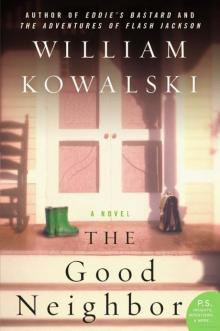 The Good Neighbor
The Good Neighbor Eddie's Bastard
Eddie's Bastard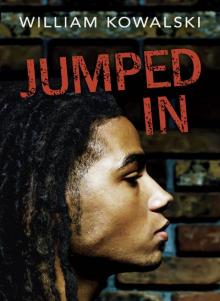 Jumped In
Jumped In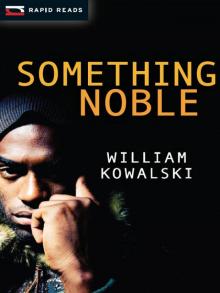 Something Noble
Something Noble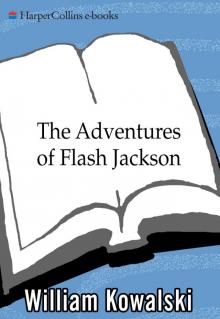 The Adventures of Flash Jackson
The Adventures of Flash Jackson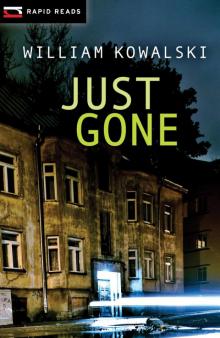 Just Gone
Just Gone The Way It Works
The Way It Works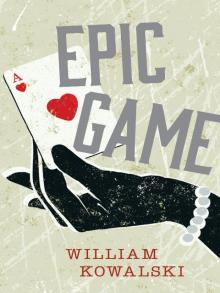 Epic Game
Epic Game